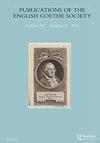在规范与历史之间:温克尔曼的艺术史学与古典观念
IF 0.1
3区 文学
0 LITERATURE, GERMAN, DUTCH, SCANDINAVIAN
引用次数: 0
摘要
摘要Winckelmann从未使用过“古典主义”一词或其衍生物“古典主义、新古典主义、古典主义”。然而,没有人的作品比他的作品与古典主义的概念联系得更紧密。最晚到了19世纪下半叶,它经常被归入古典主义或古典主义的概念:这种分类在20世纪已经成为所有欧洲国家和语言的规范。此分类的有效性如何?一部没有“古典”一词的作品能在多大程度上被归入这一标题之下?本文对这个问题提出了一些答案。本文章由计算机程序翻译,如有差异,请以英文原文为准。
Zwischen Norm und Geschichte: Winckelmanns Kunsthistoriographie und der Begriff des Klassischen
Abstract Not once does Winckelmann use the word ‘classical’ or any of its derivatives ‘classicism’, ‘neo-classicism’, ‘classicity’. And yet nobody’s œuvre is, or has been, more closely associated with the concept of the classical than his. By the second half of the nineteenth century, at the latest, it is regularly subsumed under the concept of the classical or classicism: a categorization that in the twentieth century has become the norm in all European countries and languages. How valid is this categorization? To what extent can a body of work that manages without the word ‘classical’ be brought under that heading? The present article suggests some answers to this question.
求助全文
通过发布文献求助,成功后即可免费获取论文全文。
去求助
来源期刊

Publications of the English Goethe Society
LITERATURE, GERMAN, DUTCH, SCANDINAVIAN-
CiteScore
0.10
自引率
0.00%
发文量
15
 求助内容:
求助内容: 应助结果提醒方式:
应助结果提醒方式:


